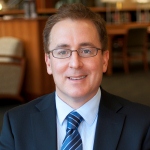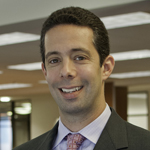W&M Law School Faculty Experts on U.S. Supreme Court Opinions
College of William & Mary News Contact: Suzanne Seurattan, [[w|scseur]], (757)221-1631
Law School Communications Office Contacts: Jaime Welch-Donahue, [[w|jpwelc]], (757)221-1840; David F. Morrill, [[w|dfmor2]], (757)221-2075
American Broadcasting Companies, Inc. v. Aereo, Inc.
 Expert: Professor James Y. Stern
Expert: Professor James Y. Stern
On Aereo:
"Aereo was certainly trying to exploit a loophole, but a loophole grounded in the need for a clear line between the kind of re-transmission cable companies do and the many ways other businesses passively enable our access to copyrighted material—everything from selling TV rabbit ears to providing phone service to maintaining Cloud storage. Unfortunately, the Supreme Court’s opinion is exceptionally murky when it comes to explaining how to tell what’s in and what’s out in any other context. In its determination to plug the Aereo loophole, the Court may well have sealed avenues needed for new information and communications technologies. Expect lots more litigation." -- James Y. Stern
Hobby Lobby
 Expert: Professor Jayne Barnard
Expert: Professor Jayne Barnard
On Hobby Lobby:
“The 5-4 split was not surprising. The focus on the dictionary definition of 'person' (the majority opinion) and concerns about women (Justice Ginsburg’s dissent) also is not surprising. What is surprising is the ultimate bottom line: the likelihood of more government-subsidized health care.” -- Jayne Barnard
Related Story Featuring Professor Barnard:
Viewing Hobby Lobby Through Lens of Corporate Law: Barnard Lead Organizer of Amicus Brief (W&M News) Read the Brief
 Experts: Professor Nathan B. Oman and Alan J. Meese
Experts: Professor Nathan B. Oman and Alan J. Meese
On Hobby Lobby:
"The Court held that closely held, for-profit corporations can pursue religious objectives and are thus RFRA persons capable of exercising religion. The Court recognized that such corporate religious exercise enhances the religious freedom of individuals, who employ for-profit corporations and other artificial entities, including non-profits, to achieve their objectives in the real world. The Court saw no reason in law or logic to distinguish for-profit corporations from non-profit corporations or other for-profit enterprises such as partnerships or sole proprietorships." -- Alan J. Meese
Related video by Professors Oman and Meese:
Video: Professors Meese and Oman on Hobby Lobby and Why For-profit Corporations are RFRA Persons
 Related Article by Professors Oman and Meese:
Related Article by Professors Oman and Meese:
Hobby Lobby, Corporate Law, and the Theory of the Firm: Why For-Profit Corporations are RFRA Persons (May 20, Harvard Law Review Forum)
Related Post by Professor Meese:
Hobby Lobby, Corporate Law, and RFRA (The Conglomerate, May 23)
Bloggers and Media Take Note of the Article:
Truth on the Market (June 2)
National Review Online (May 27)
SCOTUSblog (May 23)
The Originalism Blog (May 23)
Acton Institute (May 22)
ProfessorBainbridege.com (May 22)
First Things (May 21)
Center for Law and Religion Forum, St. John's University School of Law (May 20)
The Volokh Conspiracy (Washington Post, May 20)
Expert: Professor Timothy Zick
Lane v. Franks
 Expert: Professor Timothy Zick
Expert: Professor Timothy Zick
Professor Zick was one of more than 65 law professors who signed an amicus brief in support of the petitioner (SSRN).
McCullen v. Coakley
Expert: Professor Timothy Zick
Related Stories Featuring Professor Zick:
Zick Joins First Amendment Scholars in Amicus Brief (W&M News)
Read the Brief
 National Labor Relations Board v. Noel Canning
National Labor Relations Board v. Noel Canning
Expert: Professor Tara Grove
Related Video Featuring Professor Grove:
The Executive's Duty to Enforce the Law (TEDx Talk)
Riley v. Wurie and United States V. Wurie
Expert: Professor Adam M. Gershowitz
 On Wurie:
On Wurie:
"Today the Supreme Court clarified years of confusion and held — unanimously — that police cannot conduct a warrantless search of your cell phone without first having probable cause and a warrant. The Court recognized that police can disable the phone by powering it down or placing it in an aluminum wrap such as a Faraday bag while they wait for a warrant. Many lower courts had held the opposite and allowed warrantless cell phone searches. Based on the oral argument in April there seemed to be a strong possibility that the Supreme Court would allow warrantless searches. Today's unanimous and very broad decisions is therefore a surprise. Today's decision adopts a very clear rule for the police to follow -- a rule many police departments will not like. Civil liberties organizations will consider the decision a very significant victory." -- Adam M Gershowitz
Related Scholarship by Professor Gershowitz:
Seizing a Cell Phone Incident to Arrest: Data Extraction Devices, Faraday Bags, or Aluminum Foil as a Solution to Warrantless Cell Phone Searches (W&M Bill of Rights Journal, 2013)
Related Stories & Video Featuring Professor Gershowitz:
Cell Phone Searches: Gershowitz's Amicus Brief Argues Aluminum Foil Is Simple Remedy (W&M News)
Read the Brief
Facebook, Cell Phones, and the Fourth Amendment (W&M News, Video)
Low-Tech High Court to Weigh Police Searches of Smartphones (ABA Journal, April 1)
Search, Seizure and Cellphones (NPR Boston, April 29)
Supreme Court Taking Up Police Searces of Data Troves Known as Cellphones (New York Times, April 27; also featured on CNBC.com)
Call It the 'MacGyver' Fix: Aluminum Foil May Solve Cell Phone Search Dilemma (Bloomberg BNA, March 18)
Your Cellphone: Private or Not? (USA Today, September 9)
What Seized Cellphones and Leftovers Have in Common (Wall Street Journal, August 13)